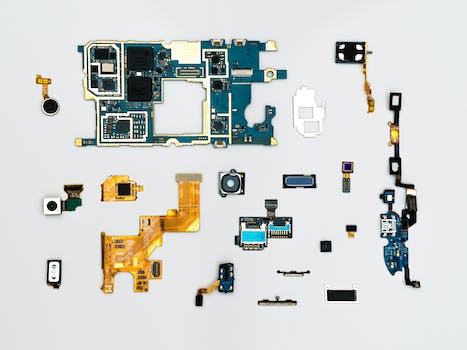-
Table of Contents
- Introduction
- How Autonomous Aircraft Could Revolutionize Air Travel
- Exploring the Potential of Hyperloop Technology for Air Travel
- The Impact of Artificial Intelligence on Air Travel
- How Virtual Reality Could Transform the Air Travel Experience
- Examining the Benefits of Electric Aircraft for Air Travel
- Conclusion
“Explore the Possibilities of Air Travel: Discover the Latest Technologies and Innovations on nishankhatri.xyz!”
Introduction
Welcome to nishankhatri.xyz, your source for insights on the future of air travel. Here, you will find the latest news and developments in the world of air travel technology and innovations. We will explore the potential of new technologies, such as autonomous aircraft, electric aircraft, and more, and how they could shape the future of air travel. We will also discuss the challenges and opportunities that come with these new technologies, and how they could impact the industry. Finally, we will look at the potential of new business models and how they could revolutionize the way we travel. So, join us as we explore the exciting possibilities of the future of air travel.
How Autonomous Aircraft Could Revolutionize Air Travel

The aviation industry is on the cusp of a revolution. Autonomous aircraft, or aircraft that can fly without a pilot, are set to revolutionize air travel.
Autonomous aircraft are equipped with advanced sensors and software that allow them to navigate and fly without the need for a human pilot. This technology has the potential to make air travel safer, faster, and more efficient.
Safety is one of the biggest benefits of autonomous aircraft. Autonomous aircraft are equipped with sophisticated sensors and software that can detect and avoid obstacles and other aircraft. This technology can help reduce the risk of human error, which is the leading cause of aviation accidents.
Autonomous aircraft can also fly faster and more efficiently than traditional aircraft. Autonomous aircraft can fly at higher altitudes and speeds, allowing them to cover more ground in less time. This could lead to shorter flight times and lower fuel costs.
Autonomous aircraft could also reduce air traffic congestion. Autonomous aircraft can be programmed to fly in predetermined routes, allowing them to avoid other aircraft and reduce the risk of mid-air collisions. This could help reduce air traffic delays and make air travel more efficient.
Finally, autonomous aircraft could reduce the cost of air travel. Autonomous aircraft require less maintenance and fewer personnel, which could lead to lower operating costs. This could make air travel more affordable for everyone.
Autonomous aircraft are set to revolutionize air travel. This technology has the potential to make air travel safer, faster, and more efficient. It could also reduce air traffic congestion and make air travel more affordable. The future of air travel is here, and it looks bright.
Exploring the Potential of Hyperloop Technology for Air Travel
The future of air travel is here, and it’s called Hyperloop technology. Hyperloop technology is a revolutionary new form of transportation that could revolutionize the way we travel. It is a high-speed, low-pressure tube system that uses magnetic levitation to propel passengers and cargo at speeds of up to 700 mph.
Hyperloop technology has the potential to revolutionize air travel by providing a faster, more efficient, and more cost-effective way to travel. It could reduce the time it takes to travel between cities from hours to minutes, and could even make it possible to travel between cities in different countries in a matter of minutes.
The technology is still in its early stages, but it has already been tested in a number of locations around the world. In 2017, Hyperloop One conducted a successful test run in the Nevada desert, reaching speeds of up to 240 mph. In 2018, Virgin Hyperloop One conducted a successful test run in India, reaching speeds of up to 387 mph.
The potential of Hyperloop technology for air travel is immense. It could reduce travel times, reduce costs, and reduce emissions. It could also make air travel more accessible to people who may not be able to afford traditional air travel.
The future of air travel is here, and it’s called Hyperloop technology. This revolutionary new form of transportation has the potential to revolutionize the way we travel, making it faster, more efficient, and more cost-effective. It could reduce travel times, reduce costs, and reduce emissions. It could also make air travel more accessible to people who may not be able to afford traditional air travel. The future of air travel is here, and it’s called Hyperloop technology.
The Impact of Artificial Intelligence on Air Travel
The impact of artificial intelligence (AI) on air travel is undeniable. AI has revolutionized the way we travel, making it easier, faster, and more efficient than ever before. From automated check-in systems to virtual assistants, AI has made air travel more convenient and enjoyable for passengers.
AI has enabled airlines to streamline their operations, reducing costs and improving customer service. Automated check-in systems allow passengers to check in quickly and easily, without having to wait in line. AI-powered virtual assistants can provide personalized customer service, helping passengers with their queries and providing them with the information they need. AI can also be used to predict flight delays and cancellations, allowing airlines to better manage their operations and provide passengers with more accurate information.
AI has also enabled airlines to offer more personalized services to their customers. AI-powered chatbots can provide passengers with personalized recommendations based on their preferences and past travel history. AI can also be used to analyze customer data and provide insights into customer behavior, allowing airlines to better understand their customers and tailor their services accordingly.
Finally, AI can be used to improve safety and security in air travel. AI-powered facial recognition systems can be used to identify passengers and detect suspicious behavior. AI can also be used to monitor aircraft systems and detect potential problems before they become serious.
In conclusion, AI has had a profound impact on air travel, making it easier, faster, and more efficient than ever before. AI has enabled airlines to streamline their operations, reduce costs, and provide more personalized services to their customers. AI has also improved safety and security in air travel, making it a safer and more secure experience for passengers.
How Virtual Reality Could Transform the Air Travel Experience
The air travel experience has been largely unchanged for decades, but with the emergence of virtual reality (VR) technology, the industry is poised to undergo a major transformation. VR has the potential to revolutionize the way we travel, from the moment we book our tickets to the moment we arrive at our destination.
For starters, VR could make the booking process much more interactive and engaging. Instead of simply looking at pictures of a destination, travelers could use VR to explore the area in a virtual environment. This would allow them to get a better sense of the destination before they book their tickets.
Once travelers have booked their tickets, they could use VR to get a better sense of the airport and the plane they’ll be flying on. Airlines could create virtual tours of their planes and airports, allowing travelers to get a better sense of the layout and amenities before they arrive. This could help reduce anxiety and make the travel experience more enjoyable.
On the plane, VR could be used to provide passengers with a more immersive entertainment experience. Instead of watching a movie on a small screen, passengers could put on a VR headset and be transported to a virtual world. This could make long flights much more enjoyable and help pass the time more quickly.
Finally, VR could be used to help travelers explore their destination once they arrive. Airlines could create virtual tours of popular attractions and destinations, allowing travelers to get a better sense of the area before they even leave the airport. This could help travelers make the most of their time in a new place.
Overall, VR has the potential to revolutionize the air travel experience. From the moment we book our tickets to the moment we arrive at our destination, VR could make the experience more interactive, immersive, and enjoyable. It’s an exciting time for the industry, and we can’t wait to see what the future holds.
Examining the Benefits of Electric Aircraft for Air Travel
The future of air travel is here, and it’s electric. Electric aircraft are becoming increasingly popular as a viable alternative to traditional fuel-powered aircraft. With the potential to reduce emissions, noise, and fuel costs, electric aircraft are quickly becoming the preferred choice for air travel.
Electric aircraft are powered by electric motors, which are powered by batteries. This eliminates the need for fuel, which reduces emissions and noise. Electric aircraft are also more efficient than traditional fuel-powered aircraft, meaning they can fly farther and faster with less energy. This makes them ideal for short-haul flights, as they can cover the same distance in less time and with fewer emissions.
Electric aircraft also offer cost savings. Electric motors are cheaper to maintain than traditional fuel-powered engines, and electric aircraft require less fuel, meaning lower fuel costs. Additionally, electric aircraft are quieter than traditional aircraft, meaning they can fly closer to populated areas without disturbing the peace.
Finally, electric aircraft are more environmentally friendly than traditional aircraft. Electric aircraft produce no emissions, meaning they have a much lower environmental impact than traditional aircraft. Additionally, electric aircraft are much quieter than traditional aircraft, meaning they can fly closer to populated areas without disturbing the peace.
Electric aircraft are quickly becoming the preferred choice for air travel. With the potential to reduce emissions, noise, and fuel costs, electric aircraft offer a number of benefits that make them an attractive option for air travel. As electric aircraft technology continues to improve, it’s likely that electric aircraft will become the standard for air travel in the near future.
Conclusion
The future of air travel is bright, with technology and innovations continuing to drive the industry forward. With the advent of new technologies such as electric aircraft, autonomous flight, and advanced air traffic control systems, the industry is poised to become even more efficient and cost-effective. Additionally, the development of new materials and manufacturing processes will enable aircraft to become lighter and more fuel-efficient, while the use of data analytics and artificial intelligence will help airlines better manage their operations. As the industry continues to evolve, air travel will become even more accessible and enjoyable for passengers.















